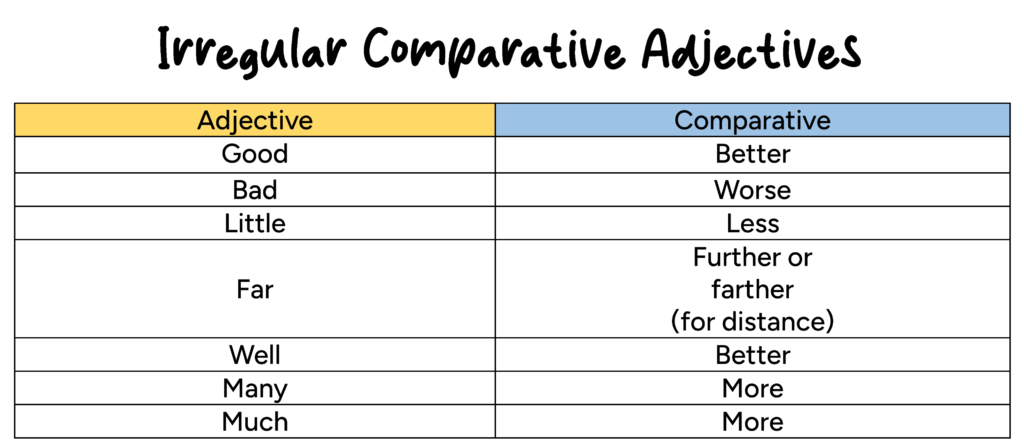In this section you will learn everything about comparative and superlative adverbs
What are comparative adverbs?
Comparative adverbs are used to compare the actions between two people, things or places.
I always do the task more accurately than Sabrina.
You sing louder than me.
They work harder than I do.
Note: only gradable adverbs can be used to make comparisons.
How to form comparative adverbs
1-For one-syllable adverbs, just add ‘-er’ and if they end in ‘-e’ just add ‘-r’.
Deep = Deeper
Fast = Faster
Wide = Wider
Note: do not confuse comparative adverbs with comparative adjectives, some have the same form but have a different function. Comparative adverbs modify verbs not nouns.
2-For two-syllable adverbs, just add ‘more’ before the adverb.
Eagerly = More eagerly
Gracefully = More gracefully
Accurately = More accurately
3-For adverbs that are formed by adding ‘-ly’, just add ‘more’.
Quick = Quickly = more quickly
Beautiful = Beautifully = more beautifully
Sad = Sadly = more sadly
4-There are comparative adverbs that take two forms and both are correct.
Close = Closer or more closely
Slow = Slower or more slowly
Loud = Louder or more loudly

The opposite
We use less to indicate that an action has a lower degree compared to something else.
He organized the event less efficiently.
What are superlative adverbs?
We use superlative adverbs to compare the actions of three or more people, things or places in a group indicating that one of those nouns surpasses all others.
How to form superlative adverbs
1-For one-syllable adverbs, just add ‘-est’ and if they end in ‘-e’, just add ‘-st’.
Deep = Deepest
Fast = Fastest
Wide = Widest
2-For two-syllable adverbs, just add ‘most’ before the adverb.
Eagerly = Most eagerly
Gracefully = Most gracefully
Accurately = Most accurately
3-For adverbs that are formed by adding ‘-ly’, just add ‘most’.
Quick = Quickly = most quickly
Beautiful = Beautifully = most beautifully
Sad = Sadly = most sadly
4-There are comparative adverbs that take two forms and both are correct.
Close or closely = Closest or most closely
Slow or slowly = Slowest or most slowly
Loud or loudly = Loudest or most loudly

The opposite
We use least to indicate that an action has a lowest degree compared to others.
I run the least quickly in the group.
An activity you can do is to write comparative and superlative adverbs in sentences, this will help you to understand better the topic.
Read more about adverbs here.
Read more about types of adverbs here.